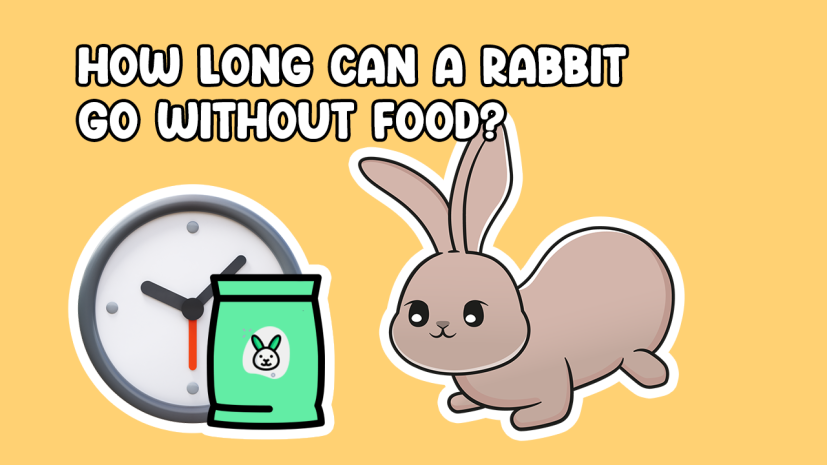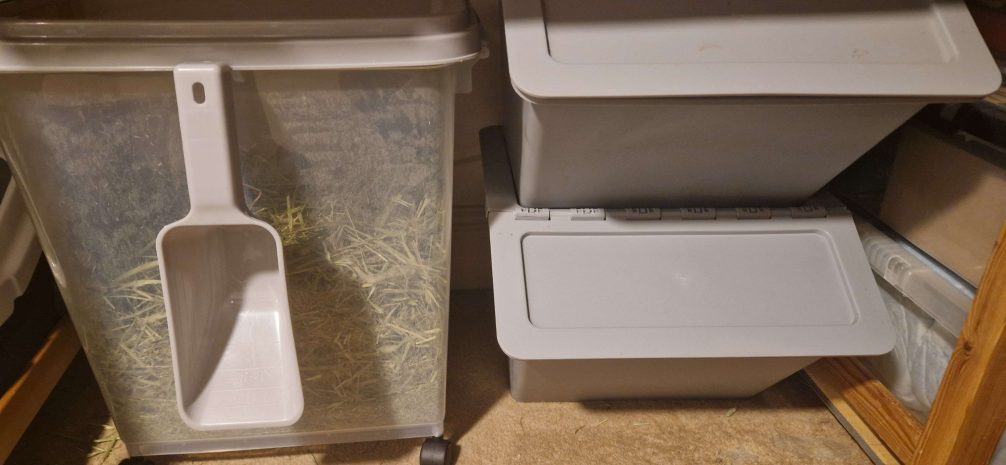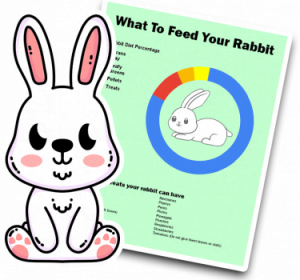
One crucial aspect of rabbit care is understanding their dietary requirements, including how long they can survive without food. In this article, we will explore the question, “How many hours can a rabbit survive without food?” to provide you with essential insights and guidance on your rabbit’s diet.
Rabbits have unique digestive systems designed for a high-fiber diet, primarily hay and fresh vegetables. As herbivores, their gastrointestinal tract is optimized to extract maximum nutrition from plants.
However, despite their specialized digestion, rabbits still require a constant food intake to sustain their metabolic functions. As hindgut fermenters, food should typically pass through your rabbit reasonably constantly, and whilst 12 to 24 hours may seem like a long time, it isn’t.
A rabbit’s ability to survive without food depends on several factors, including its age, overall health, and environmental conditions. Generally, a healthy adult rabbit can survive without food for approximately 12 to 24 hours. However, it is essential to note that rabbits have sensitive digestive systems, and prolonged fasting can have severe consequences, such as GI Stasis, which can be life-threatening.
Pellets are a common component of a rabbit’s diet. They provide essential nutrients and help ensure that rabbits receive a balanced diet. However, there may be situations where your rabbit cannot access pellets for a certain period.
A healthy adult rabbit with access to an appropriate alternative diet, such as an abundance of fresh hay and a variety of vegetables, can survive without pellets for several days. However, it is crucial to monitor the rabbit closely during this time and ensure it is still consuming an adequate amount of fiber and nutrients from other sources.
The general gist is that domestic rabbits need an additional helping hand with nutrition, and pellets provide that. As long as your rabbit eats hay and vegetables, it should be fine for a few days if you cannot get hold of any pellets for whatever reason. Here’s a list of precautions with that in mind:
If you work a 9-5 or are out for most of the day, it may be worth reconsidering if a rabbit is a pet for you. They are incredibly social animals and require much care and attention due to their nature as prey animals.
You should be giving your rabbit access to unlimited hay and water constantly. Pellets can be distributed by automatic feeders and can usually be timed to produce pellets at specific times.
If you are going on holiday or need to leave for an extended time, ensure you have a friend or family member who can look over your rabbit; alternatively, visit a boarding home in advance and check if they are suitable to look after it.
If you have a friend come over, consider downloading our FREE RABBIT CARE CARDS & PRINTABLE GUIDE and putting it up to help them!

Water is essential for the overall health and well-being of rabbits. It plays a vital role in maintaining proper hydration, facilitating digestion, regulating body temperature, and supporting various physiological functions. Your rabbit should be drinking around 10
While the exact duration a rabbit can survive without water varies depending on several factors, it is generally recommended to provide rabbits with access to fresh water at all times. Rabbits have a limited ability to tolerate dehydration compared to some other animals.
Typically, a rabbit can survive without water for approximately 12 to 24 hours. However, it is essential to note that even a short water deprivation can adversely affect their health and well-being.
Without having access to water, your rabbit will be prone to dehydration which can lead to life-threatening consequences, such as:
The first step is to always provide your rabbit with access to clean and fresh water. This can be achieved using a sturdy water bottle or a bowl (We suggest a bowl) easily accessible to the rabbit. Regularly check the water source to ensure it is clean and replenish it as needed.
Monitoring your rabbit’s water intake is also essential. Keep a close eye on how much water your rabbit consumes daily.
In addition to offering plain water, incorporating water-rich foods into your rabbit’s diet can contribute to their overall hydration. Leafy greens and vegetables, such as lettuce, cucumber, and celery, contain high water content and can supplement your rabbit’s water intake. However, it is important to introduce new foods gradually and in moderation to avoid digestive issues.
You can also rehydrate your rabbit using a syringe which can be easily picked up in stores and in bulk from sites like Amazon. Simply fill the syringe with water and carefully place the stub in the corner of your bunny’s mouth. Release small, measured bursts of water and allow your pet to swallow and relax between each burst.
If your rabbit isn’t a fan of syringe feeding, try using the bunny burrito technique, but do be careful, as this can lead to further dehydration through exerting themselves.
Why isn’t my rabbit drinking their water?
There are a few possible reasons why your rabbit isn’t drinking water. If the water smells or tastes different from what they are accustomed to, they may refuse to drink it. To entice them to drink, it’s essential to ensure the water is fresh and clean.
Temperature can also affect a rabbit’s willingness to drink water. Rabbits generally prefer water that is at a similar temperature to their surroundings. They may reject it if the water is too cold or hot.
Dental problems can significantly affect a rabbit’s ability to drink water. If they have dental issues, such as overgrown teeth or dental pain, they may find it difficult and uncomfortable to eat and drink. In such cases, seeking veterinary care to address dental problems and provide suitable treatment is crucial.
Sometimes, a rabbit may feel adequately hydrated if they consume a lot of leafy vegetables. Leafy greens have high water content and can contribute to their overall hydration.
If your rabbit is ill or has an underlying health condition, they may refuse to eat and drink. A wide range of ailments can cause rabbits to reject food and water. If you notice a persistent refusal to drink water, it is advisable to consult a veterinarian for a thorough examination and appropriate treatment.
Understanding why your rabbit is not drinking water is essential for their health and well-being. By addressing the potential causes and providing suitable solutions, you can encourage them to drink and ensure they stay adequately hydrated.
This is a two-pronged answer, and it is strongly advised never to subject your rabbit to fasting. Rabbits have sensitive digestive systems, depriving them of food for extended periods can lead to serious health complications. However, depending on their circumstances, rabbits may be able to live without food for up to 24 hours.
We advise against this. Your rabbit should always have access to a supply of fresh hay.
If your rabbit hasn’t eaten for 12 hours, try offering them a treat or fresh produce. If they still aren’t eating or are displaying signs of discomfort, take them to the vet as soon as possible.

By entering your email address you agree to receive emails from Cottontailclub. We'll respect your privacy and you can unsubscribe at any time.